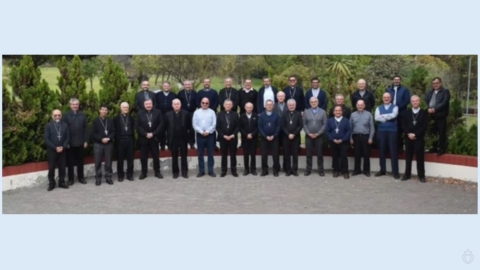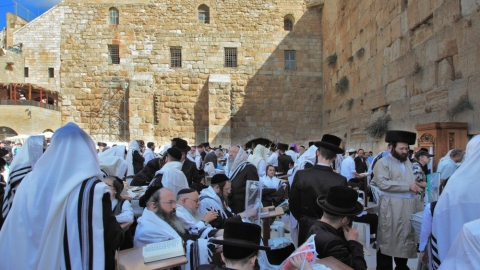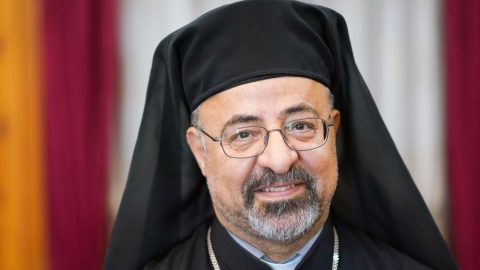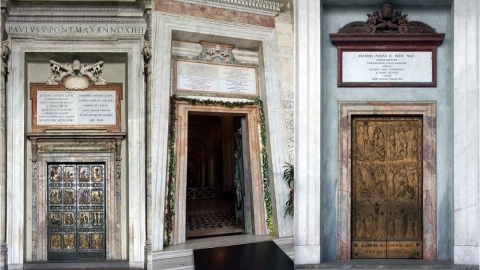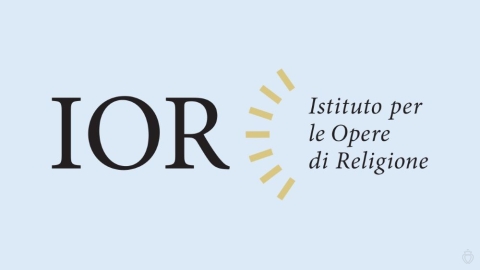Syria: Bombings in Aleppo every day

In a letter published on May 28, Archbishop Jean-Clément Jeanbart, archbishop of Aleppo, confided to Aide à l'Église en Détresse (AED - Help to the Church in Distress) "his great sorrow on finding our Archbishopric destroyed and our Cathedral seriously damaged," upon his return from the United States, where he had done his best, he added, "to expose our situation to American Christians." "We are paying dearly for our presence in our dear country, continued the archbishop, but we know that the future will be much better for our new generations once peace is established and freedom won. In the meantime shells are raining down on us every day. We do not know when this greatly desired peace will come, but we beg the Lord to grant it as soon as possible and we firmly believe that He will do so, for His goodness is great and His mercy is ineffable. Pray with us, I beg you; your prayers will be a great help to us."
Since the beginning of the Syrian conflict, the calls not to leave the country and the help from charities "have not been enough to keep half the Christians of Aleppo from leaving the country for good." If we wish the other half of the Christians to remain, the only solution is "to put an end to the war", explained Dr. Nabil Antaki, lay member of the community of Marist Brothers in Aleppo, to the association Coordinamento per la Pace in Siria, on May 28. In the name of the community of Aleppo, he called directly upon Pope Francis: "We beg you to use your moral authority, your incontestable prestige to put pressure on the different governments to stop arming and financing the armed groups, and to put up an effective fight against Daesh and to put an end to the passage of terrorists over our northern borders. For a negotiated political solution to work, the opposition has to accept the present government in Syria because it is impossible to negotiate with someone whose departure is our first request."
Nabil Antaki also explained the situation of the Syrian martyr city: "Aleppo is divided into two parts: the east of the city with its population of 300,000 is in the hands of the armed groups, and the west, with its population of 2 million is under the control of the Syrian State. That is where we live and work. We do not know what is going on in the other part of the city. We are bombarded daily by the jihadists and many hospitals in our zone of the city have been destroyed, burned or damaged by their action." And the doctor added that "although the situation is bad, Aleppo is no longed under a blockade as it was a year and a half ago. People and products enter and leave by a road opened by the government 17 months ago. Supplies enter, and nobody is dying of hunger, even if 80% of the population receive food stamps. Yes, the city is surrounded but there is still this road that links us to the outside. The city is damaged but the people continue to live, making do with the constant water and electricity outages... as the centers are in the jihadist hands."
Concerning the geopolitical interests feeding the Syrian conflict, Nabil Antaki pointed out that "ever since 2011 the Syrians have understood that what was happening was not a revolution to bring more democracy to Syria, more respect for fundamental rights and less corruption. The Syrians have known from the start that the 'Arabian Spring' was a new name for the 'constructive chaos' of Concoleezza Rice (United States Secretary of State from January 2005 to January 2009) and the 'new Middle East' of the Bush administration, and that this 'springtime' in Syria would have established either chaos and the destruction of the country or an Islamic State. Unfortunately, both alternatives risk being realized."
On May 14, Bishop Antoine Audo, Chaldean bishop of Aleppo, answered the press agency I.Media's questions with no illusions as to the future of Syria's second most important city. "What we are living through in Aleppo is very serious. At the beginning of the events, over four years ago and until recently, my attitude was one of great hope that we might find a solution for reconciliation and peace, but I am realizing more and more that there is a veritable determination to destroy and divide Syria. It is the fruit of joint efforts on a regional level between Saudi Arabia who finances without a doubt and Turkey who gathers and trains armed groups to send them to Aleppo, a few kilometers from its border."
The Chaldean bishop of Aleppo confided to the press agency Fides on May 8 the daily reality of the Christian families who have remained: "The bombs rain down on us every day. I think that many Christians will flee Aleppo and seek refuge in the coastal zone but they will only do so once the schools and universities of central Aleppo are closed, after the exams. It is paradoxical (...) when we are living in a city that seems to have no future."
While international agencies reported that the jihadist militias in the region of Aleppo have consolidated their positions around the military airport, Bishop Audo explained: "for over three years now, to leave Aleppo, we have no longer used the airports that are in disputed zones. There seems to be an intense propaganda and psychological warfare, orchestrated on an international level, by a manipulation of information. They talk of an upcoming attack on Aleppo, declaring that Aleppo is at the end of its rope. Maybe they are preparing something." The Chaldean bishop added that the news concerning the Christians are often instrumentalized as well, explaining that "from the start, everything has been done to present this conflict as a confrontation between Christians and Muslims or between Shiites and Sunnites. The Christians are the least defended group, it is true. The Christians have no arms and they are afraid. But certain slogans and orchestrated reading guides only help to hide the real reasons and dynamics of the war. There are those who wish to divide the entire zone into small sectarian entities, as they tried to do in Iraq, in order to turn them against each other and continue to dominate them all." That is, to divide the Middle East into confessional and ethnical entities in order to dominate the region, was his conclusion according to I.Media.
In an interview at the patriarchal see of Bkerke on March 19, published by Aide à l'Eglise en Détresse (AED) on May 5, Cardinal Bechara Boutros Rai, Maronite patriarch of Lebanon, voiced his opinion on the war in Syria. Worried about the religious balance in Lebanon with the mass arrival of 1.5 million Syrian refugees (for a population of 4 million), the cardinal explained that "most of them are Sunnites. On the political and religious level, they could be exploited by the Lebanese Sunnites." "We have already experienced the same thing with the Palestinians, he continued. In the 1970's, they were the ones who started the civil war against the Lebanese and the Lebanese army. Last year, at the first confrontation between the Lebanese army and the IS (Islamic State), the army was attacked by armed Syrian Sunnites. In the long term, it's a time bomb. The war in Syria and Iraq needs to end so that people can return to their countries. Time is not in our favor.... especially since the Syrians work for lower rates than the Lebanese." Cardinal Rai concluded by saying that the Muslims of the Middle East need Jesus Christ and the Gospel values: hearing of nothing but war, hatred, persecution, assassinations, transfers and fundamentalism, the Muslims "need the antidote of Jesus Christ's Gospel".
(Sources: fides/aed/imedia/afp/lorientlejour/siriapax - Dici no.317 dated June 26, 2015)
Read also :
Syria: Redoubled shooting on the city of Aleppo
Syria: A catholic church attacked by the islamic state
Syria: Facing the country’s destruction
